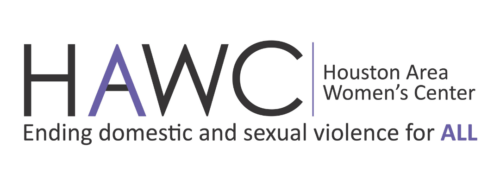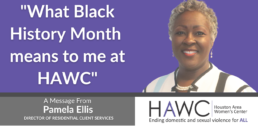Dear Friends of HAWC,
My name is Pamela Ellis and I currently have the honor of serving as the Houston Area Women’s Center Director of Residential Client Services. I started at HAWC 35 years ago, which makes me the longest-tenured staff member in the organization. I write to you today as a Black woman who has been a leader in the movement to end domestic and sexual violence for my entire professional life. In honor of Black History Month, I want to share my story of service and the wisdom I have gained over the years.
As the Director of Residential Client Services, I am privileged to oversee our emergency shelter and the holistic services we offer to residents, including counseling, financial coaching, and case management with a focus on access to housing, health care, and employment. Day in and day out, I see first-hand the courage of survivors, how they manage the trauma the best they know how with the tools they have at their disposal. To me, supporting their healing and transformation is sacred work.
It is also my responsibility to work with our on-campus HISD elementary school educators and to ensure that our licensed childcare and after-school programs are top-notch. Many people don’t realize that our campus is full of children, eager to learn, grow, and heal. There is simply nothing more gratifying than seeing children emerge from their shells, shed their pain, and reclaim their voice. I love it when I see them asserting their boundaries in a healthy way. Helping children find their courage and ask for what they need and deserve from the adults in their life is my passion.
Prior to serving as the Director of Residential Services, I worked in various capacities throughout the organization including administrative support, volunteer coordination, violence prevention education and community outreach. While working full time, I completed my bachelor’s degree at Texas Southern University and then went on to receive a master’s in social work from the University of Houston. I am proud to pay-forward my opportunity to combine academic achievement with direct service by supporting student interns at HAWC from Texas Southern University.
After 35 years of service in this organization, I consider myself somewhat of an expert on the human condition. This is what I know: Humans need to be loved and cared for, always. And when we do not get that basic need met, we suffer. Neglect, abuse, and violence come in many forms – at the hands of someone, in their actions, or words. The impact of those experiences, particularly if they are longstanding and ongoing, gets deeply rooted in our bodies and in our sense of self. Healing takes time and requires resources. This is true for all of us.
- A significant part of my journey has been attending to the disproportionate toll that interpersonal violence takes on Black women.
A staggering 45% of Black women experience domestic violence, compared to 33% of all women. - Compared to women overall, Black women experience significantly higher rates of abuse, sexual assaults, rape, and psychological abuse—including humiliation, insults, name-calling, and coercive control.
- Compared to white women, Black women are three times more likely to be fatally shot by an intimate partner.
- Younger Black women ages 18 to 34 years are at the greatest risk. We are five times as likely to be shot and killed by an intimate partner than white women in the same age group.
For many, these are simply statistics. To me, they are women with faces and names and stories. What I know now for certain is that violence not only comes between individuals but also and, perhaps more importantly, from systems and structures. That violence might not appear as obvious because it may not leave a bruise, but the harm it causes is as real as any visible wound.
This type of violence comes in the form of laws, policies, practices and mindsets that have racial fear and hatred at their root. It looks like jobs that don’t pay fairly, housing that is unavailable, neighborhoods that are under-resourced, health systems that ignore Black patients, and images and messages that deny the full humanity of Black women. Until and unless we root out the hatred that drives this systemic violence and redesign our communities around caring for everyone, HAWC will never be able to shut our doors. And as much as I love my job, I desperately long for a day where our services are no longer needed.
Thank you for listening to my truth, for supporting our work at HAWC, and for centering the wisdom and courage of Black women not just in Black History month but every day of the year.
All my best,
Pamela Ellis
Looking for another way to give? When you donate stock,
you may earn 2-3X the tax savings vs. donating in cash.
Want to do more?
Join Texans across the state striving to create a safer Texas by completing a Purple Postcard in support of services for victims of family violence.
What is #HAWCFutureForward? Learn more about how HAWC is expanding safety and improving access.
Are you ready for a rewarding career empowering survivors of domestic and sexual violence? Join HAWC and #PursueYourPassion! Review open positions and apply today.
There are many ways to make a difference at HAWC, learn more at Get Involved.


